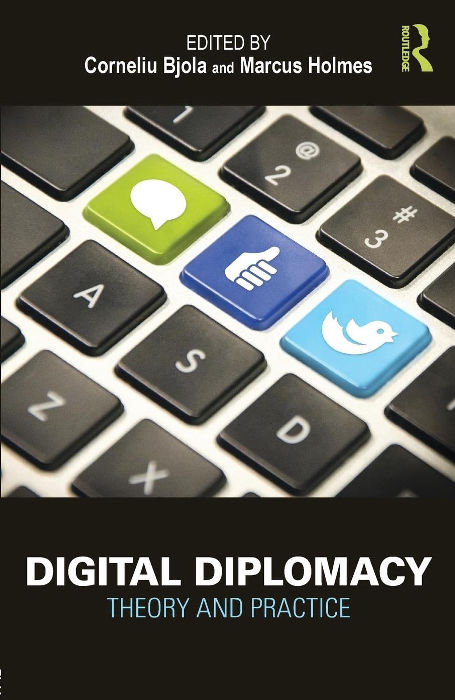Books
Corneliu Bjola
Digital Diplomacy
Theory and Practice
In a world transformed by tweets and trending hashtags, Digital Diplomacy: Theory and Practice by Corneliu Bjola explores how foreign ministries are adapting to the digital age. As governments rush to harness the power of social media, diplomacy itself is undergoing a revolution—one that demands new strategies, skills, and mindsets. This book is a front-row seat to the intersection of technology and international relations. For anyone curious about how states now communicate, negotiate, and manage crises in real time, Bjola’s work is an indispensable guide.
Digital Diplomacy: Theory and Practice analyzes the rise of digital initiatives in foreign ministries, framing them as a form of change management within international politics. Bjola and his contributors argue that the adoption of digital diplomacy—especially the use of social media for diplomatic purposes—has fundamentally altered how diplomats manage information, conduct public diplomacy, plan strategy, negotiate, and respond to crises. Despite the widespread belief that digital technology has revolutionized diplomacy, the book notes that the analytical understanding of these changes remains limited. To address this gap, the volume brings together leading scholars and experienced policymakers, offering a blend of theoretical, empirical, and policy-oriented perspectives.
The book’s central aim is to theorize what digital diplomacy is, assess how it relates to traditional diplomatic practices, and examine the power dynamics it introduces. It explores the conditions under which digital diplomacy can inform, regulate, or constrain foreign policy, moving beyond the notion that digital tools are merely supplementary to traditional statecraft. Instead, the contributors investigate how digital diplomacy can be leveraged strategically, not just tactically, to advance state interests and manage international change. Organized around the theme of digital diplomacy as change management, the book covers topics ranging from social media’s role in public diplomacy to the measurement of digital impact and the challenges of integrating new technologies into established diplomatic institutions.
What sets this volume apart is its interdisciplinary approach, combining insights from international relations, communication studies, and organizational theory. Digital Diplomacy: Theory and Practice is essential reading for students and practitioners of diplomatic studies, foreign policy, and international relations, as well as anyone interested in the evolving role of technology in global affairs. By bridging the gap between theory and practice, the book offers a comprehensive roadmap for understanding—and mastering—the digital transformation of diplomacy.

